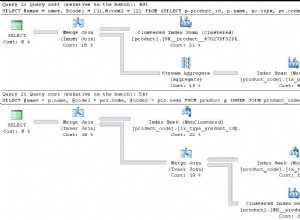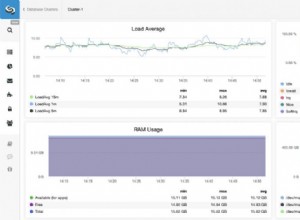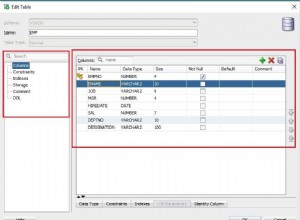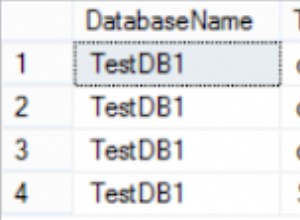Eu uso postgres para uma fila FIFO também. Eu originalmente usei ACCESS EXCLUSIVE, que produz resultados corretos em alta simultaneidade, mas tem o efeito infeliz de ser mutuamente exclusivo com pg_dump, que adquire um bloqueio ACCESS SHARE durante sua execução. Isso faz com que minha função next() bloqueie por muito tempo (a duração do pg_dump). Isso não era aceitável, pois somos uma loja 24 horas por dia, 7 dias por semana e os clientes não gostaram do tempo morto na fila no meio da noite.
Achei que deveria haver um bloqueio menos restritivo que ainda seria seguro para concorrência e não bloquearia enquanto o pg_dump estivesse em execução. Minha busca me levou a este post SO.
Então fiz algumas pesquisas.
Os seguintes modos são suficientes para uma função FIFO queue NEXT() que atualizará o status de um trabalho de enfileirado para executar sem nenhuma falha de simultaneidade e também não bloquear contra pg_dump:
SHARE UPDATE EXCLUSIVE
SHARE ROW EXCLUSIVE
EXCLUSIVE
Inquerir:
begin;
lock table tx_test_queue in exclusive mode;
update
tx_test_queue
set
status='running'
where
job_id in (
select
job_id
from
tx_test_queue
where
status='queued'
order by
job_id asc
limit 1
)
returning job_id;
commit;
Resultado se parece com:
UPDATE 1
job_id
--------
98
(1 row)
Aqui está um script de shell que testa todos os diferentes modos de bloqueio em alta simultaneidade (30).
#!/bin/bash
# RESULTS, feel free to repro yourself
#
# noLock FAIL
# accessShare FAIL
# rowShare FAIL
# rowExclusive FAIL
# shareUpdateExclusive SUCCESS
# share FAIL+DEADLOCKS
# shareRowExclusive SUCCESS
# exclusive SUCCESS
# accessExclusive SUCCESS, but LOCKS against pg_dump
#config
strategy="exclusive"
db=postgres
dbuser=postgres
queuecount=100
concurrency=30
# code
psql84 -t -U $dbuser $db -c "create table tx_test_queue (job_id serial, status text);"
# empty queue
psql84 -t -U $dbuser $db -c "truncate tx_test_queue;";
echo "Simulating 10 second pg_dump with ACCESS SHARE"
psql84 -t -U $dbuser $db -c "lock table tx_test_queue in ACCESS SHARE mode; select pg_sleep(10); select 'pg_dump finished...'" &
echo "Starting workers..."
# queue $queuecount items
seq $queuecount | xargs -n 1 -P $concurrency -I {} psql84 -q -U $dbuser $db -c "insert into tx_test_queue (status) values ('queued');"
#psql84 -t -U $dbuser $db -c "select * from tx_test_queue order by job_id;"
# process $queuecount w/concurrency of $concurrency
case $strategy in
"noLock") strategySql="update tx_test_queue set status='running{}' where job_id in (select job_id from tx_test_queue where status='queued' order by job_id asc limit 1);";;
"accessShare") strategySql="lock table tx_test_queue in ACCESS SHARE mode; update tx_test_queue set status='running{}' where job_id in (select job_id from tx_test_queue where status='queued' order by job_id asc limit 1);";;
"rowShare") strategySql="lock table tx_test_queue in ROW SHARE mode; update tx_test_queue set status='running{}' where job_id in (select job_id from tx_test_queue where status='queued' order by job_id asc limit 1);";;
"rowExclusive") strategySql="lock table tx_test_queue in ROW EXCLUSIVE mode; update tx_test_queue set status='running{}' where job_id in (select job_id from tx_test_queue where status='queued' order by job_id asc limit 1);";;
"shareUpdateExclusive") strategySql="lock table tx_test_queue in SHARE UPDATE EXCLUSIVE mode; update tx_test_queue set status='running{}' where job_id in (select job_id from tx_test_queue where status='queued' order by job_id asc limit 1);";;
"share") strategySql="lock table tx_test_queue in SHARE mode; update tx_test_queue set status='running{}' where job_id in (select job_id from tx_test_queue where status='queued' order by job_id asc limit 1);";;
"shareRowExclusive") strategySql="lock table tx_test_queue in SHARE ROW EXCLUSIVE mode; update tx_test_queue set status='running{}' where job_id in (select job_id from tx_test_queue where status='queued' order by job_id asc limit 1);";;
"exclusive") strategySql="lock table tx_test_queue in EXCLUSIVE mode; update tx_test_queue set status='running{}' where job_id in (select job_id from tx_test_queue where status='queued' order by job_id asc limit 1);";;
"accessExclusive") strategySql="lock table tx_test_queue in ACCESS EXCLUSIVE mode; update tx_test_queue set status='running{}' where job_id in (select job_id from tx_test_queue where status='queued' order by job_id asc limit 1);";;
*) echo "Unknown strategy $strategy";;
esac
echo $strategySql
seq $queuecount | xargs -n 1 -P $concurrency -I {} psql84 -U $dbuser $db -c "$strategySql"
#psql84 -t -U $dbuser $db -c "select * from tx_test_queue order by job_id;"
psql84 -U $dbuser $db -c "select count(distinct(status)) as should_output_100 from tx_test_queue;"
psql84 -t -U $dbuser $db -c "drop table tx_test_queue;";
O código também está aqui se você quiser editar:https://gist.github.com/1083936
Estou atualizando meu aplicativo para usar o modo EXCLUSIVE, pois é o modo mais restritivo que a) está correto eb) não entra em conflito com pg_dump. Eu escolhi o mais restritivo, pois parece o menos arriscado em termos de alterar o aplicativo de ACCESS EXCLUSIVE sem ser um especialista em bloqueio de postgres.
Sinto-me bastante confortável com meu equipamento de teste e com as ideias gerais por trás da resposta. Espero que compartilhar isso ajude a resolver esse problema para outras pessoas.




